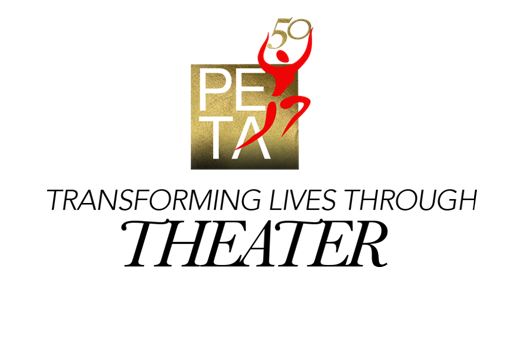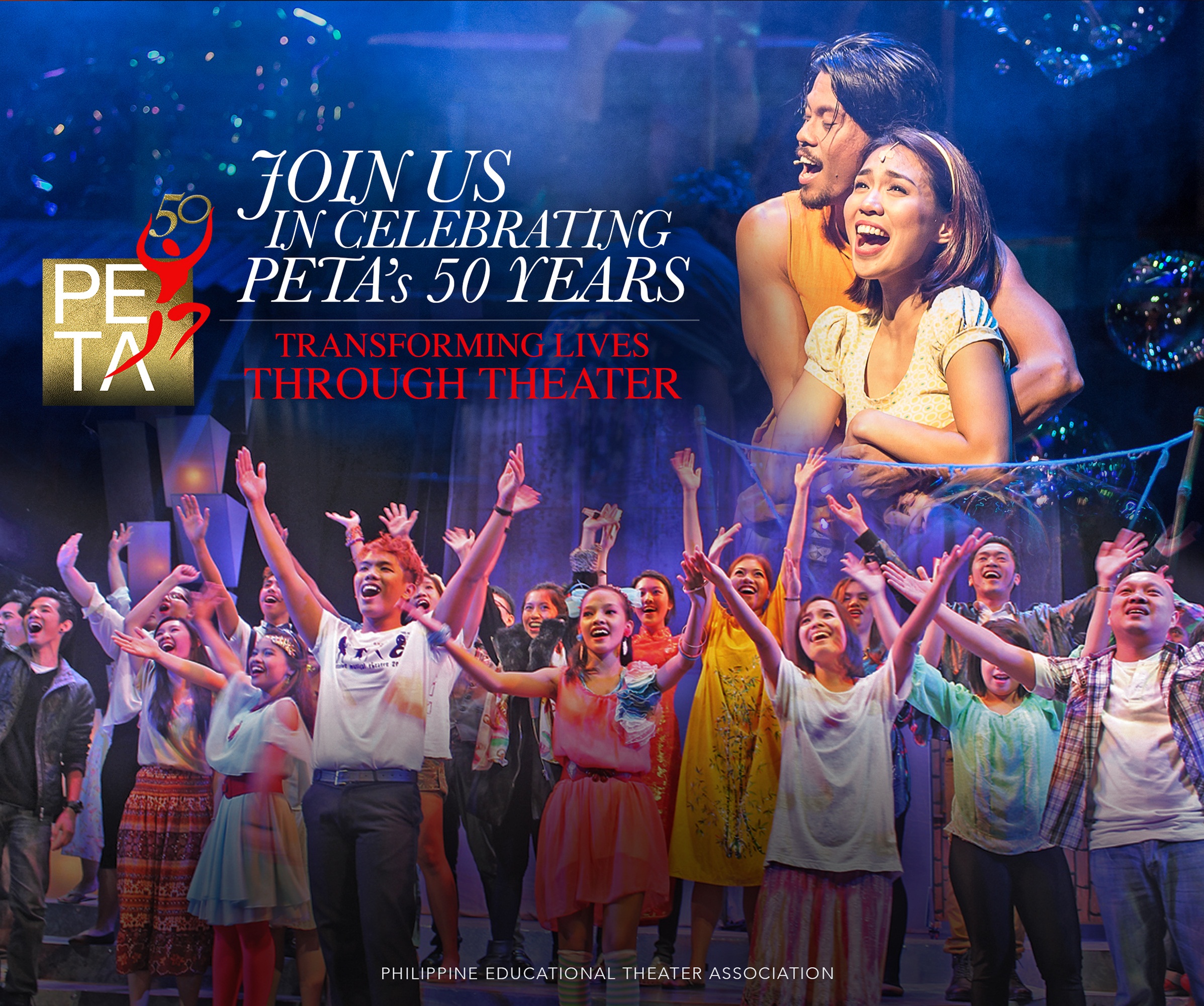Take PETA Theater Beyond 50
Fundraising campaign by
Marie Gold Lim
-
US$1.00raised of $5,000.00 goal goal
Campaign Story
We are hitting the big 5-0! Which means decades and decades worth of plays, workshops and communities and lives transformed on and off stage.
PETA could not have survived this long without the help of friends and supporters like YOU. Join us in celebrating our 50th year anniversary! Even the smallest gift can help PETA continue its work.
There are two ways to support:
A.) POPULAR FUND (500php - 9,999.00php.)
B.) CIRCLE OF FRIENDS - (10,000php and up - you will receive a copy of the PETA History book and Commemorative CD of PETA Original Music)
Your contribution will support the roster of activities for the 50th year. By giving, you will help PETA continue its work and nurture future story tellers, artists, and cultural workers. You also allow those who may not have financial resources to gain access to our programs. Think of reaching a child from the most far flung of the country or of changing a community for the better for as little as five hundred pesos!
Got questions? Call or text Angelica Heruela @ 09273709581 or 4100822 / 7256244 loc. 12.
You may also email us at [email protected] or [email protected]
Maraming Salamat po!
Cecilia B. Garrucho
PETA President
PETA HISTORY
Cecile Guidote-Alvarez founded the Philippine Educational Theater Association (PETA) on April 7, 1967 with the vision of a Philippine Theater engaged in the development of people and society.
In 1971, PETA became the UNESCO-ITI (International Theater Institute) Center in the Philippines, and in the same year it organized the first Third World Theater Festival, held in the 400th year of the foundation of the City of Manila.
When its founder was forced to go on political exile because of Martial Law in 1972, PETA’s new breed of artist-teacher-leaders continued to steer the company towards a People’s Theater committed to social change.
The social conditions and political climate during the Martial Law sharpened the people-based theater aesthetics of PETA. It inspired the company to use the power of theater as a means of producing plays for empowerment and development, especially of the most disadvantaged sectors of society/those in the margins.
PETA began by asserting the then radical view of creating and performing plays in Filipino. Most of PETA’s plays were staged at the historic Dulaang Rajah Sulayman, an open-air theater designed by National Artist Leandro V. Locsin. By the 90’s, it boasted of a solid record of some 300 plays written, translated, adapted, published and performed, which shaped the company’s theater history, enriching it through theater forms and techniques that expressed local, national and universal themes. Among PETA’s earlier plays have been: Bayaning Huwad, Larawan, May-i, May-i, Hanggang Dito na Lamang at Maraming Salamat, Juan Tamban, Pilipinas Circa 1907, Ang Buhay ni Galileo, Macbeth, Canuplin, Macliing, Minsa’y Isang Gamu-Gamo, Ang Paglalakbay ni Radya Mangandiri, 1896.
In 2005 PETA fulfilled one of long-term goals when it moved to a permanent home, The PETA Theater Center. A landmark in Philippine Arts and Culture, the center in itself is a testament to the creativity, ingenuity, resilience of PETA. The center now serves as a physical base for the entire gamut of PETA undertakings, from professional theater repertory performances, year round workshops and its community and outreach programs.
Settled in its new home, PETA continued to mount out-of-the box, cutting-edge productions that mainstreamed relevant issues that engaged its urban audiences. PETA’s modern repertoire ranged from fresh adaptations of world classics like Haring Lear, Arbol de Fuego (Anton Chekhov’s The Cherry Orchard), to staging iconic children’s theater productions like Mga Kuwento ni Lola Basyang, and Batang Rizal. Most recently, the company has also explored the use of modern pop music to maintain the connection with its evolving audience. Its contemporary musicals include Skin Deep, William, Care Divas and its phenomenal musical hit Rak of Aegis.
Relentless in seeking out new audiences, it vigorously partnered with schools, parishes and communities all over the country to ensure that it is able to share its rich educational performances to as many Filipinos as possible. The company embarked on many exhilarating tours. Its mobile plays included Tumawag kay Libby Manaoag, Si Juan Tamad and Diyablo at ang Limang Milyong Boto, Hans Christian Andersen Must Be a Filipino, Noli at Fili Dekada dos Mil, Rated:PG, ASL...Please! and Padayon.
Through its inspired leadership and the contribution of its dedicated members and staff, PETA mastered its triple bottom lines of artistic excellence, relevance and viability while remaining true to its vision of using theater as a tool for education, social change and development.
To this end, PETA is committed to pursue its theater/cultural work in the following areas:
Theater for Artistic Development (TAD) – working for greater artistic excellence to be able to move and enlighten people through our plays; to be the best of what we could ever be – artists, writers, directors, actors, singers, dancers, choreographers, composers, designers, and cultural managers – full of passion to draw from the tradition and culture of excellence of our own people, while continuously experimenting on contemporary forms, thus helping create in a spiraling manner the evolving tapestry of a people’s creativity and cultural fecundity;
Theater in Education (TIE) – working to help teachers become more creative and inspiring in the classroom; to enhance the quality of education, especially in our public schools, through the arts and the theater; to work with the youth to help produce a new generation of Filipinos endowed with a limitless sense of imagination, pride of place, love for country, and a sensitivity to care for fellow Filipinos and fellow humans; to generate a grounded, rooted, comprehensive theater arts programs in schools that is Filipino in perspective and universalist in dimension; and
Theater for Development (TFD) – pursuing a genuine people’s development agenda, especially for those in the margins of society, to build the creative capacities of people who are excluded by virtue of poverty, race, ethnicity, religion, etc., so that they may be able to assert their rights and participate in matters that determine their lives and their future; to create, in solidarity with our people, a quality of life for all sectors in constant struggle with all forms of deprivation and oppression, showing the path of creativity for reaching holistic and sustainable development.
PETA remains inspired by the ideals of nationhood, global understanding, respect of person, democratization and greater participation of the people in theater, culture and social development. PETA remains committed to the same ideals that it was built upon.
Join PETA and its members in further pursuing a vision of our people and society whose life will be enriched and empowered with each gesture, word, image, sound, expression, and creative learning experience. This is PETA’s continuing way to serve communities… through our theater work, on, off and beyond the stage.
Organizer
- Marie Gold Lim
- Campaign Owner
No updates for this campaign just yet
Donors & Comments
- Anonymous
- Donated on Jul 12, 2017




